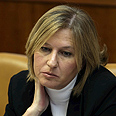



Barak: I'm not afraid to sit in the opposition
Livni? A qualified woman surrounded by thugs; Netanyahu? The surefire route to a confrontation with the entire world; The Saudi peace plan? I'm willing to go meet the king in Riad. Labor Chairman Ehud Barak sits down with Ynet as he embarks – yet again – on the fight of his life, but this time fully prepared for the opposition wilderness
"I'm not a magician and I'm not perfect," Labor Chairman Ehud Barak concedes during his interview with Ynet, "I'm not blind – surely I've made a few mistakes. On the political level, in how I conducted myself, by focusing on making peace or reasserting Israel's might based on the lessons of war. I focused on that and ignored other things – this was a mistake."
"It's true that people are angry with me, angry with Labor, and that's fine. Be angry with us, lash out at us, condemn us. But don't punish yourselves. At the end of the day we're talking about people's lives."
Pollsters attribute the exodus from Labor as an abandonment of supporters to both the left and the right – namely to Meretz and Kadima, respectively – but Barak urges voters to think twice.
"A country isn't a game. You're not choosing a person, you're choosing a party. Only an idiot would think that by giving his vote to Kadima he is also giving it to a bloc – he's not. It could be that the morning after the elections the results are 60-60, and Bibi (Likud Chairman Benjamin Netanyahu) offers some people in Kadima two ministerial posts, a deputy minister and a committee chair, and people will leave. These are people prone to doing that. They've done it before, they left in the past but they can jump back. In Kadima you don't know if you've given your vote to Livni… or to clear-cut rightists.
"It's an ambiance party, that is responsible for the sidelines of the disengagement and its consequences, for the Second Lebanon War – and now they're telling us it's 'a different kind of politics.' There's a qualified woman at its head, but she's surrounded by people who have been convicted of criminal offenses and never appealed, people who are being investigated, and we're not just talking about one or two. Kadima (lit. 'forwards') means Backwards."
But Barak minces no words when asked about the new left-wing movement either: "Anyone who can see what's in front of them must realize that Meretz's new leftist movement is based on the trend of bashing Labor, among other reasons because it's difficult to face reality. In dreams you arrange everything as you want it to be. Amos Oz is an immense author, but when you deal with atmosphere rather than reality, you forget to note that Oz has been in Meretz for 20 years. When Ynet's readers were just learning how to read, he was in Meretz. He has always criticized Labor, there's no news here."
'Hamas has grown weaker'
On the peacemaking front Barak finds much merit with the Saudi peace initiative, and says he "would be willing to travel to the king's palace, or to Europe, to hold open or clandestine discussions on using the initiative as a basis for a process of regional peace." He wants Israel to put forward an Israeli initiative based on the Saudi one, while simultaneously continuing on the Palestinian and Syrian tracks.
In terms of practicality, he opposes the right of return for Palestinians, but is willing to consider isolated cases based on humanitarian concerns. He's willing to see parts of east Jerusalem as the future Palestinian capital. "We'll have to find a formula that sees Palestinians returning to Palestine – and not necessary to the actual house in Herzliya or Ramle."
Many are growing increasingly concerned however as the Palestinian Authority prepares for its own general elections in early 2009, when Palestinian President Mahmoud Abbas – at least, Hamas believes – will step down.
"I think he'll stay on," says Barak. "But that doesn't mean there won't be constitutional difficulties. Abu-Mazen (Abbas) and (Palestinian Prime Minister) Fayyad are growing stronger in the West Bank, among other reasons because of our willingness to allow them to bring in troops trained in Jordan, to deploy policemen in Jenin, to open checkpoints and take risks. The Palestinians are trying to enforce order, and they've even begun dealing with Hamas. They're arresting hundreds of people in South Mt. Hebron – some Hamas, some not. It's not perfect, but there is progress, in the economic sector too."
Will Israel intervene to help Abbas?
"I don't think it's accurate to portray us as his crutch. It's important for Abu Mazen to be seen as legitimate. He may fall – our wisdom is in waiting. If in three months' time the ceasefire collapses and we're forced to act in Gaza, we're in a better position that we were two years ago, when Hamas overtook Gaza. Today Abu Mazen is much stronger in Judea and Samaria, and Hamas is weakened. This guarantees a smaller risk of an undesired result."
'I'm not afraid to be the opposition'
And what of Netanyahu's Likud? "They'll lead us to a regional confrontation and then to a confrontation with the whole world. The world over is swamped with the economic challenge, with political issues, and they expect to see progress here in the region. The Israeli-Palestinian conflict is a yoke. Netanyahu and the Likud will lead us as they have in the past into a standoff with the world over policies that will lead us to a dead end."But would Labor still consider joining a government under Netanyahu?
"We will not join a government if its foundation is not in line with ours. We are not afraid to sit in the opposition. We will demand negotiations with the Palestinians, and with the Syrians, we will demand to see an Israeli proposal for a comprehensive peace. The economy, the collapse of which is the responsibility of Bibi and the Likud, must be helped back to its feet according to our way of doing things."
It's doubtful you'll get what you're after. Are you declaring yourself the next opposition chairman?
"Gladly. If that's what the voters decide. Bibi's way leads to stagnation and a political dead end and social ruin. If we can't be in a centrist-left bloc capable of forming a government, then I will lead the opposition. But if Netanyahu changes his spots and our way prevails – how could we not consider (joining his coalition)?"
What would constitute a failure in these elections?
"Failure would be a centrist-leftist bloc where Labor isn't the driving force behind the creation of a government. That's failure. According to the polls it doesn't look like I'll be prime minister this time, but it's not out of the question that people will read things and the situation will change. Polls aren't realia. I'm not afraid to be opposition chairman, even if my being opposition chairman means we have failed in our appeal to the public to let us lead it. But right now I'm not concerned with the day after, but the day before. In any event, I'm here for the long term."
Roni Sofer contributed to this report















